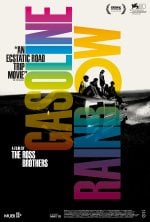Latest Movie Trailers & Videos
A Stork’s Journey 2
Official Trailer
Good One
Official Trailer
Twisters
Official Trailer #2
Fancy Dance
Official Trailer
Firebrand
Official Trailer
Fresh Kills
Official Trailer
Treasure
Official Trailer
The Hangman
Official Trailer
Summer Solstice
Official Trailer
The Commandant's Shadow
Official Trailer
Megalopolis
First Look Clip
Boneyard
Official Trailer
Ghostlight
Official Trailer
Finding Tony
Official Trailer
Tell That to the Winter Sea
Official Trailer
Beyond The Tree Line
Official Trailer
Rhapsody In Justice
Official Trailer
The Execution
Official Trailer
Sleep
Official Trailer
Lee
Official Teaser
Bad Behaviour
Official Trailer
Copa 71
Official Trailer
Let It Be
Official Trailer
The Shameless
Official Trailer
New Movies Coming Out This Week
Kitty The Killer
VOD / Digital
For Sale
Limited
Mind Body Spirit
VOD / Digital
Ruby's Choice
VOD / Digital
The Last Movie Ever Mad...
VOD / Digital
Sira
VOD / Digital
Let It Be
Disney+
The Beatles: Let It Be
Disney+
Mother of the Bride
Netflix
Kalki 2898-AD
Limited
Kingdom of the Planet o...
Nationwide
Tarot
Nationwide
We Grown Now
Nationwide
Not Another Church Movi...
Limited
Force of Nature: The Dr...
Limited
Poolman
Limited
Lazareth
Limited
The Image of You
Limited
The Last Stop in Yuma C...
Limited
Gasoline Rainbow
Limited
Aisha
Limited
Hazard
Limited
Living with Leopards
Netflix
Finding Tony
VOD / Digital
Amelie Movie Review
originally posted many years ago
Jean-Pierre Jeunet’s Le Fabuluex Destin d’Amelie Poulain (the title card title is Amelie of Montmartre, but the English title is simply Amelie) is an exercise in happiness; a film so full of irresistible joy and love it is virtually impossible to dislike.
Jeunet (co-director of Delicatessen and The City of Lost Children) brings his technical wizardry and whimsical sense of humor to the story of Amelie (Audrey Tautou), a young woman living in Paris circa 1997. On the very evening Princess Diana dies in a car crash in that city, Amelie uncovers a nostalgic treasure she decides to return to its owner, and upon doing so, decides to dedicate her life to helping others.
Amelie is a perfectly conceived film, executed with narrative brilliance and cinematic panache. To begin-Audrey Tautou is a wonder. Her face-at times as pale as that of a doll-is fascinating; her expressions and feelings divulge as the film goes on and she grows. It is a wonderfully textured performance for which Tautou (who was far less compelling in another French comedy, Happenstance) appears to be born for. She is aided by a strong supporting cast of noteworthy French actors, including actor/director Mathieu Kassovitz as Amelie’s would-be lover, comedian Jamel Debbouze as the lovable Lucien, and Raymond Dufayel as her frail neighbor.
Technically, the film is brilliant. Jeunet is a special effects master, and utilizes innovative techniques-along with the editing of Herve Schneid-to allow Amelie’s world to come alive. Bruno Delbonnel’s Oscar-nominated cinematography is an inviting pastiche of yellows, greens, and browns assembled into a beautiful, fluid, even dreamlike world. Composer Yann Tiersen milks an unforgettable theme throughout the film, one that, like Amelie herself, is desperate when played slowly, and fierce and energetic when assigned a faster tempo.
And yet one can discuss all this and not even touch on the sheer brilliance of the material-the only thing that really matters. Needless to say, with all the awards-night elements in perfect order, the films enchanting atmosphere is matched by narrative whimsy and urgent emotions that create a modern fairy tale. As Amelie concocts elaborate, sly plans both to help people and to flirt with Kassovitz, her ultimate problem-a little darker than the film would have you to believe-is a need to be physically alone. She’s always able to help others, but is uncomfortable around them-particularly in making them happy. This transfers to her elusive affair with Kassovitz, and as she is drawn closer to him she confuses her love for altruism with love itself. This critical emotional crisis (also highlighted masterfully in Jane Austen’s Emma) is what keeps the film rolling.
The onslaught of beauty is at times breathtaking, even diverting; perhaps Amelie’s biggest flaw is its inherent, even bothersome, cuteness. It’s never conventional, but, like Jeunet’s other projects, is can be a little overwhelming.
Excluding that eternal wonder of love, Amelie is a film void of pretense. Rather, it’s a delicious journey of imaginative entertainment; a big cinematic lollipop meant to be savored.
Jeunet (co-director of Delicatessen and The City of Lost Children) brings his technical wizardry and whimsical sense of humor to the story of Amelie (Audrey Tautou), a young woman living in Paris circa 1997. On the very evening Princess Diana dies in a car crash in that city, Amelie uncovers a nostalgic treasure she decides to return to its owner, and upon doing so, decides to dedicate her life to helping others.
Amelie is a perfectly conceived film, executed with narrative brilliance and cinematic panache. To begin-Audrey Tautou is a wonder. Her face-at times as pale as that of a doll-is fascinating; her expressions and feelings divulge as the film goes on and she grows. It is a wonderfully textured performance for which Tautou (who was far less compelling in another French comedy, Happenstance) appears to be born for. She is aided by a strong supporting cast of noteworthy French actors, including actor/director Mathieu Kassovitz as Amelie’s would-be lover, comedian Jamel Debbouze as the lovable Lucien, and Raymond Dufayel as her frail neighbor.
Technically, the film is brilliant. Jeunet is a special effects master, and utilizes innovative techniques-along with the editing of Herve Schneid-to allow Amelie’s world to come alive. Bruno Delbonnel’s Oscar-nominated cinematography is an inviting pastiche of yellows, greens, and browns assembled into a beautiful, fluid, even dreamlike world. Composer Yann Tiersen milks an unforgettable theme throughout the film, one that, like Amelie herself, is desperate when played slowly, and fierce and energetic when assigned a faster tempo.
And yet one can discuss all this and not even touch on the sheer brilliance of the material-the only thing that really matters. Needless to say, with all the awards-night elements in perfect order, the films enchanting atmosphere is matched by narrative whimsy and urgent emotions that create a modern fairy tale. As Amelie concocts elaborate, sly plans both to help people and to flirt with Kassovitz, her ultimate problem-a little darker than the film would have you to believe-is a need to be physically alone. She’s always able to help others, but is uncomfortable around them-particularly in making them happy. This transfers to her elusive affair with Kassovitz, and as she is drawn closer to him she confuses her love for altruism with love itself. This critical emotional crisis (also highlighted masterfully in Jane Austen’s Emma) is what keeps the film rolling.
The onslaught of beauty is at times breathtaking, even diverting; perhaps Amelie’s biggest flaw is its inherent, even bothersome, cuteness. It’s never conventional, but, like Jeunet’s other projects, is can be a little overwhelming.
Excluding that eternal wonder of love, Amelie is a film void of pretense. Rather, it’s a delicious journey of imaginative entertainment; a big cinematic lollipop meant to be savored.
You're browsing the archives, check out the latest movie news.





















































